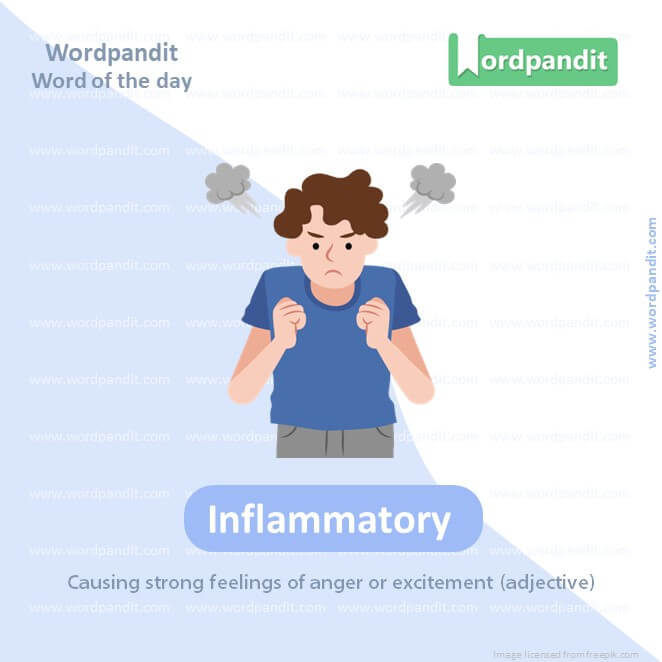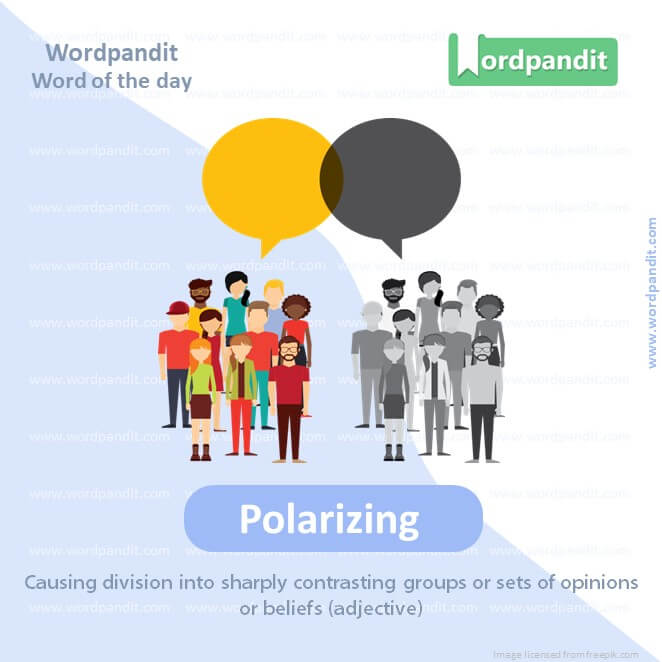Daily Vocabulary Words: List of Daily Used Words in Leading International Newspapers
Hi there. Welcome to this special section @ Wordpandit.
Our endeavour here is very simple: to highlight important daily vocabulary words, which you would come across in leading newspapers in the country. We have included the following newspapers in our selection:
• The New York Times
• The Washington Post
• Scientific American
• BBC
• The Guardian
• Psychology Today
• Wall Street Journal
• The Economist
We are putting in extensive work for developing your vocabulary. All you have got to do is be regular with this section and check out this post on a daily basis. This is your repository of words that are commonly used and essentially, we are posting a list of daily used words. Hence, this has significant practical application as it teaches you words that are used commonly in leading publications mentioned above.
Visit the website daily to learn words from leading international newspapers.

WORD-1: Harmoniousness
CONTEXT: The group has a free handbook that urges wolf advocates and officials to avoid potentially inflammatory terminology — words like “coexistence,” which imply a harmoniousness that might never be felt.
SOURCE: New York Times
EXPLANATORY PARAGRAPH: Harmoniousness is like when everyone in a music band plays their instruments in a way that sounds really nice together. It’s when things fit together in a peaceful and pleasant way.
MEANING: The quality of being in agreement and free from discord (noun).
PRONUNCIATION: har-MOH-nee-us-ness
SYNONYMS: Concord, Unity, Agreement, Accord, Compatibility.
USAGE EXAMPLE:
1. The harmoniousness of the team led to their success.
2. She admired the harmoniousness of the garden’s design.
3. The harmoniousness among the choir members was evident in their performance.
4. They worked in harmoniousness to complete the project on time.

WORD-2: Inflammatory
CONTEXT: The group has a free handbook that urges wolf advocates and officials to avoid potentially inflammatory terminology — words like “coexistence,” which imply a harmoniousness that might never be felt.
SOURCE: New York Times
EXPLANATORY PARAGRAPH: Inflammatory is like saying or doing something that makes others really upset or angry, like calling names or teasing someone.
MEANING: Causing strong feelings of anger or excitement (adjective).
PRONUNCIATION: in-FLAM-uh-tor-ee
SYNONYMS: Provocative, Incendiary, Agitating, Instigating, Provoking.
USAGE EXAMPLE:
1. The politician’s inflammatory speech caused a lot of debates.
2. She posted an inflammatory comment on social media that sparked controversy.
3. The article was inflammatory and upset many readers.
4. He was known for his inflammatory remarks during discussions.

WORD-3: Polarizing
CONTEXT: A 2016 study found that 61 percent of Americans reported positive attitudes toward wolves, so it’s worth remembering that stories about wolves polarizing us can become a self-fulfilling prophecy.
SOURCE: New York Times
EXPLANATORY PARAGRAPH: Polarizing is when something causes people to have very different opinions about it. It’s like when some people really love a movie and others really don’t like it at all.
MEANING: Causing division into sharply contrasting groups or sets of opinions or beliefs (adjective).
PRONUNCIATION: POH-luh-ry-zing
SYNONYMS: Divisive, Contentious, Controversial, Disputatious, Provocative.
USAGE EXAMPLE:
1. The new policy was polarizing among the employees.
2. His polarizing views on the subject led to heated arguments.
3. The film was polarizing; people either loved it or hated it.
4. The debate was a polarizing event in the community.

WORD-4: Spearheaded
CONTEXT: And the inclusive model of community-led conservation spearheaded by Colorado and the Western Landowners Alliance can be applied to other environmental and social issues.
SOURCE: New York Times
EXPLANATORY PARAGRAPH: Spearheaded is like being the leader or the first person to start something, like being the first in line or the captain of a team leading a game.
MEANING: Led or initiated an activity or project (verb).
PRONUNCIATION: SPEER-hed-ed
SYNONYMS: Led, Headed, Pioneered, Initiated, Championed.
USAGE EXAMPLE:
1. She spearheaded the campaign for cleaner parks.
2. The scientist spearheaded a study on climate change.
3. They spearheaded the effort to raise funds for the school.
4. The CEO spearheaded the company’s expansion into new markets.

WORD-5: Stifled
CONTEXT: the continent hasn’t been overrun by immigrants. No, strong welfare states haven’t stifled the incentives to work and innovate.
SOURCE: New York Times
EXPLANATORY PARAGRAPH: Stifled is like trying to hold back a giggle or a sneeze. It’s when you stop yourself from doing something, like keeping quiet when you really want to shout.
MEANING: Restrained or stopped oneself from acting or expressing oneself freely (verb).
PRONUNCIATION: STY-fuhld
SYNONYMS: Suppressed, Smothered, Restrained, Quashed, Muzzled.
USAGE EXAMPLE:
1. He stifled a yawn during the long lecture.
2. Her creativity was stifled by the strict rules.
3. She stifled her laughter at the inappropriate moment.
4. The new regulations stifled the growth of the business.
WORD-6: Ambiguity
CONTEXT: the crowd beforehand, refusing to call it off, but not directing its actions — to create a sliver of ambiguity as to whether he personally engaged in insurrection.”
SOURCE: New York Times
EXPLANATORY PARAGRAPH: Ambiguity is when something can be understood in more than one way. It’s like a tricky riddle that might have more than one answer.
MEANING: The quality of being open to more than one interpretation; inexactness (noun).
PRONUNCIATION: am-bi-GYOO-uh-tee
SYNONYMS: Uncertainty, Vagueness, Indecisiveness, Obscurity, Doubtfulness.
USAGE EXAMPLE:
1. The ambiguity of the poem made it fascinating to discuss.
2. There was ambiguity in the rules of the game.
3. The contract was canceled due to its ambiguity.
4. She enjoyed the ambiguity in the ending of the story.
WORD-7: Envisioned
CONTEXT: the former president’s actions make him an insurrectionist by any reasonable definition of the term and certainly as it was envisioned by the drafters of the 14th Amendment
SOURCE: New York Times
EXPLANATORY PARAGRAPH: Envisioned is like picturing something in your mind, imagining what it would look like. It’s when you think about how something could be in the future.
MEANING: Imagined as a future possibility; visualized (verb).
PRONUNCIATION: en-VIZH-und
SYNONYMS: Imagined, Pictured, Visualized, Foreseen, Conceived.
USAGE EXAMPLE:
1. He envisioned a world where everyone lived in peace.
2. She envisioned the garden filled with flowers.
3. They envisioned a successful outcome for the project.
4. The architect envisioned a modern design for the new building.
WORD-8: Confederacy
CONTEXT: When it became clear that President James Buchanan would not surrender Fort Sumter to South Carolina, in late December, Floyd resigned to join the Confederacy.
SOURCE: New York Times
EXPLANATORY PARAGRAPH: Confederacy is like a group of friends or teams that come together to work towards a common goal or to help each other out.
MEANING: A league or alliance, especially of states or groups (noun).
PRONUNCIATION: kuhn-FED-uh-ruh-see
SYNONYMS: Alliance, Union, Coalition, Federation, League.
USAGE EXAMPLE:
1. The tribes formed a confederacy to defend their lands.
2. The states entered into a confederacy for mutual benefit.
3. Historical documents revealed the existence of an ancient confederacy.
4. The confederacy of the groups made them stronger.
WORD-9: Emoluments
CONTEXT: The president is also covered by the foreign emoluments clause, which applies, again, to any “person holding any office of profit or trust” under the United States.
SOURCE: New York Times
EXPLANATORY PARAGRAPH: Emoluments are like the special treats you get for doing something good, like getting a sticker for being nice. It’s the money or benefits you get from your job or position.
MEANING: Profits or benefits received as compensation for one’s work or office (noun).
PRONUNCIATION: eh-MOL-yoo-ments
SYNONYMS: Salary, Wages, Pay, Compensation, Remuneration.
USAGE EXAMPLE:
1. The director’s emoluments included a bonus and a car.
2. He questioned the legality of the politician’s emoluments.
3. The emoluments for the position were quite generous.
4. They discussed the emoluments of the new contract.
WORD-10: Fleeing
CONTEXT: Until the military dictatorship is overthrown, we remain haunted by the uncertainty of which day our lives may be extinguished,” said U Maung Maung, 25, who was injured while fleeing an airstrike in February.
SOURCE: New York Times
EXPLANATORY PARAGRAPH: Fleeing is like running away from something really fast because you’re scared or in danger. It’s like when you see a bee and run away to not get stung.
MEANING: Running away from a place or situation of danger (verb).
PRONUNCIATION: FLEE-ing
SYNONYMS: Escaping, Running, Evading, Bolting, Eluding.
USAGE EXAMPLE:
1. The family was fleeing from the hurricane.
2. The thief was caught fleeing the scene of the crime.
3. Animals were seen fleeing the forest fire.
4. She was fleeing from her past in search of a new beginning.
Vocabulary Synonyms
In the intricate weave of language learning, ‘vocabulary synonyms’ emerge as a key element that adds depth and variety to expression. These different words with similar meanings enrich our vocabulary, enabling us to communicate with precision and clarity. However, grasping ‘vocabulary synonyms’ successfully warrants a systematic approach.
When approaching ‘vocabulary synonyms’, context is your compass. Engage with various reading materials like novels, newspapers, and digital content to explore and understand how these synonyms are used in different situations. This exposure will fortify your comprehension of ‘vocabulary synonyms’ and their usage nuances.
Employing memory-enhancing techniques can cement your grasp on ‘vocabulary synonyms’. Employing flashcards is an effective method where one side contains the word you know, and the other side has its synonyms. Also, creating mind maps, linking the known word to its various synonyms, can be an engaging way to learn ‘vocabulary synonyms’.
To master ‘vocabulary synonyms’, take an active role in application. Regular conversations, written communications, digital interactions – all of these offer ample opportunities to utilize learnt synonyms. This practice refines your application and accelerates internalization of ‘vocabulary synonyms’.
Embracing language exchange platforms or engaging with native speakers can provide invaluable feedback on the usage of ‘vocabulary synonyms’. This interaction can further enhance your understanding of the cultural idiosyncrasies of word usage.
In conclusion, learning ‘vocabulary synonyms’ is a rewarding pursuit that adds layers of complexity to your language skills. A thoughtful blend of diversified resources, memory tools, practice, and interactive learning can make the task of mastering ‘vocabulary synonyms’ an enjoyable and fruitful journey. Every synonym learnt paints your vocabulary with different shades of understanding, making your language canvas all the more vivid and spectacular!











